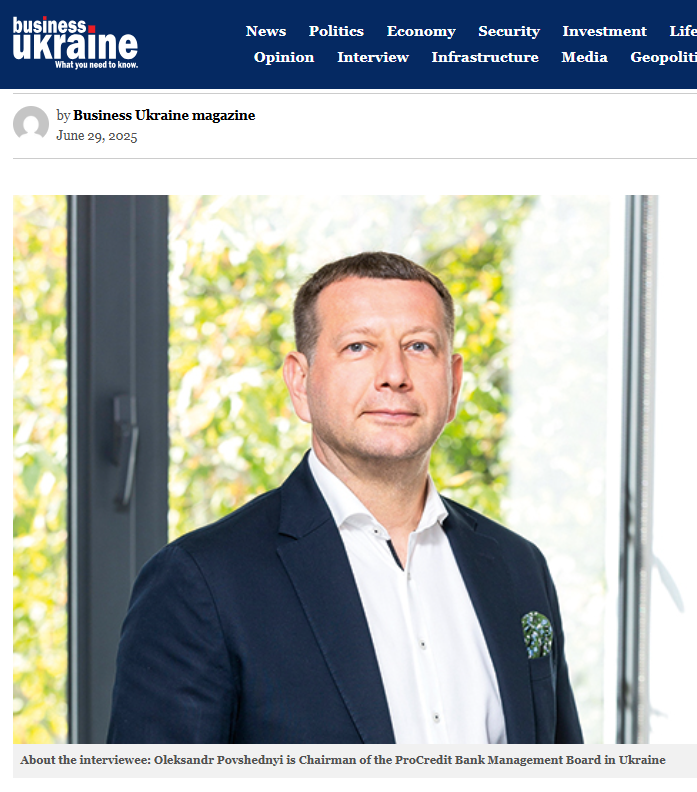We are pleased to share with you an interview with Oleksandr Povshednyi, CEO of the Management Board at ProCredit Bank Ukraine, originally published in Business Ukraine magazine¹. The interview provides a comprehensive perspective on Ukraine’s current economic situation and the increasing investment interest among Ukrainian companies.

Agriculture, energy, and automation: ProCredit Bank sees growing appetite for investment
Oleksandr Povshednyi: Ukrainian businesses have adapted to new wartime realities and are now increasingly looking to invest but banks must compete for limited number of potential clients
As Ukrainian businesses acclimatize to changing wartime realities and seek new opportunities, many of the key players in the country’s banking sector are looking to ramp up lending. But with economic growth slowing down, banks eager to expand their loan portfolios will need to compete for a limited number of potential clients, says Oleksandr Povshednyi, Chairman of the ProCredit Bank Management Board in Ukraine.
Povshednyi notes that while the current business climate in Ukraine remains extremely challenging, there are encouraging signs. He points to a tangible change in mood towards the end of 2023, when many Ukrainian company owners began to recognize that they had now moved beyond the critical period of wartime disruption and needed to turn their attention once more toward developing their businesses. As interest in investment revived in 2024, the initial focus for many companies was on practical war-related priorities such as renovations and the installation of energy-generating capacity to counter the threat posed by Russian air strikes on Ukraine’s power grid.
Throughout the first half of 2025, this investment trend has continued to evolve and gain momentum. “We are now much more positive about our ability as a bank to grow our loan portfolio,” Povshednyi comments. The numbers would certainly appear to back this up. Following a sharp initial drop of around 40 percent during the tumultuous first year of the full-scale invasion, ProCredit Bank in Ukraine saw significant growth in annual loan volumes for two consecutive years. The bank is now aiming to increase its loan portfolio by a further 20 percent during 2025.
Povshednyi expects the bulk of this growth to come from clients within the agricultural sector, which has traditionally dominated ProCredit Bank’s Ukrainian loan portfolio. He is looking to expand the bank’s green energy engagement with an emphasis on financing for solar power projects, and also sees a lot of potential in the manufacturing sector, which he regards as a strategic priority for the Ukrainian economy as a whole. “I still believe our exporters are not always welcome in European markets due to the protectionist attitudes of many local producers, but we can always find alternative markets outside Europe in the Middle East, Latin America, and elsewhere. Ukraine has a lot of high-quality products to offer.”
Ukraine’s deteriorating demographic situation is also creating potential new avenues for financing as Ukrainian companies look to address mounting staff shortages by moving towards greater automation. At least six million Ukrainians are believed to have left the country for the safety of the European Union since 2022, while many more have relocated from higher risk areas within Ukraine. This is pushing salaries up and creating recruitment issues that are being felt in virtually every sector of the country’s economy. Povshednyi cautions that Ukraine’s population outlook will likely continue to worsen. “Student enrollment at Ukrainian universities was down 30 percent in 2024. That means 30 percent fewer specialists graduating in the years to come,” he notes.
Faced with the prospect of a dwindling workforce and rising labor costs, the most realistic solution for many Ukrainian business owners will be to invest in new technologies that can help automate processes and minimize the need for large teams of workers. This is potentially good news for the country’s banks. “The search for technological solutions to Ukraine’s manpower problems can drive demand for loans,” says Povshednyi. “We are already seeing growing interest within the business community in this direction.”
With Ukrainian GDP growth expected to decline significantly in 2025, there will be considerable competition within the Ukrainian banking sector for a finite number of potential new customers seeking financing services. Povshednyi believes ProCredit Bank will benefit from a number of advantages including partnerships with international financial institutions such the EBRD that make it possible to guarantee loans and cover potential wartime gaps in collateral. The bank also enjoys strong institutional support from its shareholder in Germany and is able to offer competitive terms.
In the race to win over new clients, Povshednyi stresses that ProCredit Bank’s greatest single asset in Ukraine remains its almost four hundred employees. “We bet on our staff,” he says. “We have a rather tough selection process and invest up to one million euros each year in training programs. This allows us to attract the best and brightest people to our institution. As a result, our team have a very clear understanding of our clients and their needs. When it comes to choosing a banking partner, this is often decisive.”